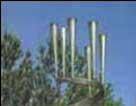
Hillel Fendel
Jews around the world, and particularly in Israel, will commemorate the six million Jews murdered in the Holocaust, as well as those who were able to fight back, beginning Wednesday evening.
Yom HaShoah V'Hagvurah, Holocaust Martyrs and Heroes Remembrance Day, begins this evening at 8 PM with a public ceremony at Warsaw Ghetto Square in Yad Vashem, Jerusalem. President Shimon Peres and Prime Minister Ehud Olmert will speak, survivors will light six torches (see below), the Chief Rabbis will recite prayers, and Cantor Asher Heinowitz will sing the El Malei Rachamim prayer. The central theme of this year's commemorations is "Choose Life." Last year, it was "Bearing Witness." At 10 PM, a symposium will be held on the topic of "Choose Life," with the participation of Holocaust survivors and Yad Vashem Chairman Avner Shalev.
The six survivors lighting the torches are the following:
* Esther Samuel-Cahn, born in 1933 in Norway. A religiously observant professor at Hebrew University in Jerusalem, she was awarded the Israel Prize in Statistics in 2004. When she was 9, her father, Rabbi Dr. Yitzchak Samuel, the rabbi of Norwegian Jewry, was arrested by the Nazis and sent to Auschwitz. Several months later, she and her family were hidden behind potato sacks and smuggled to Sweden. At age 13, a year after World War II ended, she immigrated to Israel with her mother and two brothers.
* Meir Brand, born in 1936 in Poland. In 1943, closed up in a Nazi-built ghetto, his parents decided to smuggle him out, and after many narrow escapes, he arrived in Budapest, Hungary. He was on the Kastner Train - a trainload of almost 1,700 Jews who escaped from Hungary to safety in Switzerland - but was one of the few dozen who was detained in the Bergen-Belsen concentration camp. After his rescue in 1945, he was brought to Israel via the Jewish Agency's Aliyat HaNoar (Youth Immigration) project. Here he learned that his parents had been murdered. Meir lived in the Jordan Valley's Kibbutz N'vei Eitan, and fought in most of Israel's wars.
* Naomi Shadmi, born in 1931 in Hungary. At age 13, her father, older brother and mother were abducted, one after the other, by the Nazis. Naomi and her remaining younger brother were taken to the Budapest Ghetto. After their release, they found that their relatives had been murdered. They came to Israel, where Naomi worked for Israel Police for 20 years.
* Tzvi Ungar, born in 1929 in Poland. He survived the Birkenau and Buchenwald concentration camps, as well as the infamous Death March, but the remainder of his family was murdered. In 1948, he immigrated to Israel, fought in the War of Independence, and helped found Kibbutz Malkiyah, practically atop Israel's border with Lebanon, where he still resides.
* Menachem Katz, born in 1925 in Poland. At age 17, he and his family were taken to a ghetto, then banished to the Belzec concentration camp in Poland, where an estimated 600,000 people were murdered. He escaped, and was later followed by his family. In 1946, they were caught on their way to Palestine and taken to Cyprus, where they remained for about a year. A prominent architect, Menachem designed the museum at Kibbutz Baram in memory of the Jews of Berezhany, his birthplace.
* Michael Maor, born in Germany in 1933. His family fled to Yugoslavia, then to Italy, and then to the forests with the partisans when Italy came under Nazi influence. In 1944, the Nazis murdered his parents, and he was taken to an orphanage. In Israel, he worked for the Mossad Intelligence Agency, collected evidence against Adolph Eichmann, and established the Border Guard's intelligence department.
The date of Yom HaShoah was chosen to mark the anniversary of the Warsaw Ghetto uprising. Although the day became official by an act of Knesset, it has been traditionally commemorated by Jewish communities around the world. Some religious communities prefer not to commemorate the Holocaust on this day, which falls in the generally happy month of Nissan, but rather on Tisha B'Av or on the Tenth of Tevet, which the Chief Rabbinate of Israel fixed as the day for the recital of the Kaddish prayer for those murdered during the Holocaust whose date of death is not known.
No comments:
Post a Comment